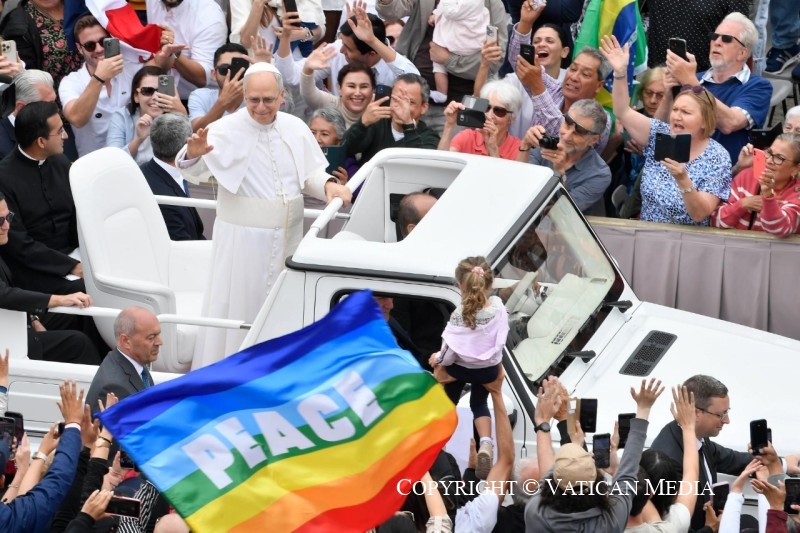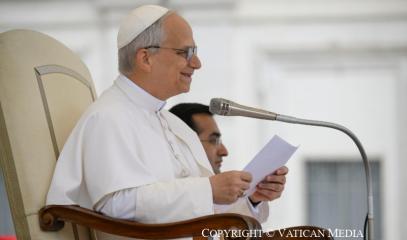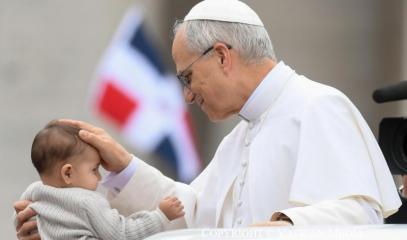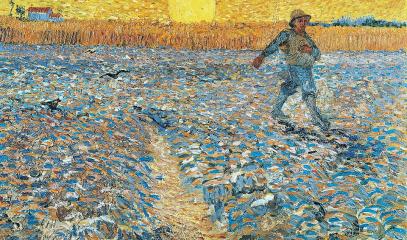Leo XIV’s first general audience on the parable of the sower: ‘God is willing to waste for us’
40,000 welcome Pope Prevost in St Peter’s Square for his first public audience. Tour in the popemobile amid cheers and flags from Lebanon, Ukraine, and peace movements. Leo XIV continues the catechetical series “Jesus Our Hope”, begun by Francis for the Jubilee. A renewed appeal for “dignified humanitarian aid” to Gaza: “We are called to sow hope and build peace.”
Vatican City (AsiaNews) – Under a hazy Roman sky, around 40,000 people gathered in St Peter’s Square this morning for Pope Leo XIV’s first General Audience. The new Pope resumed the Jubilee catechetical series “Jesus Christ, Our Hope”, picking up the reflections begun by Pope Francis.
At the heart of today’s address was the Parable of the Sower (Mt 13:1–17). Greeting pilgrims in various languages, Pope Leo XIV recalled the teaching of St Paul: “Each one will reap what he sows.”
Yesterday, he had visited the tomb of the Apostle to the Gentiles at the Basilica of St Paul Outside the Walls. “In a world divided and wounded by hatred and war,” the Pope said, “we are called to sow hope and build peace.”
Before the start of the audience, Pope Leo XIV made a lengthy tour in the popemobile—his second since the election, following the one before last Sunday’s inaugural Mass—greeting those gathered in the square.
Many reached out eagerly, smiling, hoping to get closer to the vehicle, leaning over the barriers lining the paths. Among the waving flags were those of Lebanon, Ukraine, and the United States, along with banners bearing the word “peace.” During the tour, the Pope blessed several children brought forward by his security detail.
In his greeting to Italian-speaking pilgrims, Pope Prevost turned to the “ever more worrying and painful […] situation in the Gaza Strip.” He reiterated an appeal—already made on previous occasions—for the entry of “dignified humanitarian aid” and an end to the violence, “the heartbreaking cost of which is being borne by children, the elderly, and the sick.”
In his catechesis, Pope Leo XIV reflected on how parables “help us rediscover hope” and “reveal how God works in history.” Speaking about the Parable of the Sower, which was read aloud in several languages prior to the reflection, he described it as “a sort of introduction to all the parables.”
In the story, a man sows seed on various types of ground; only the seed that fell on “good soil” bore fruit (Mt 13:8). “In this story we recognise the way Jesus communicates,” the Pope explained. “The Parable of the Sower speaks directly to the dynamics of the Word of God and the effects it produces.”
The Word is like a seed sown into “the soil of our lives”—whatever condition it may be in. Jesus often used the image of the seed. In these images, the soil represents “our hearts, but also the world, the community, the Church,” the Pope said. The Word of Jesus is “for everyone” and “works in each person in different ways.”
The sower in the parable does not worry about where the seed falls, which seems counterintuitive. “We’re used to counting and calculating things—and sometimes that’s necessary—but love doesn’t follow that logic! The way this ‘wasteful’ sower scatters the seed is an image of the way God loves us,” Pope Leo explained. God sows the “seed of his Word” on every type of soil, in every kind of life. “God is trusting and hopes that the seed will eventually blossom.”
Jesus also uses the image of the seed that dies in order to bear fruit to speak of his own life. “This parable tells us that God is ready to ‘waste’ for our sake—and that Jesus is willing to die to transform our lives,” Leo XIV said.
The Pope linked this message to a painting: The Sower at Sunset by Vincent van Gogh. “What strikes me is that Van Gogh painted ripe wheat behind the sower. It seems to me a true image of hope,” he said. The scene is not dominated by the figure of the man, but by the sun—“perhaps to remind us that it is God who moves history, even when He seems absent or distant.” That same sun warms the earth and allows the seeds to bear fruit.
“We ask the Lord for the grace always to welcome this seed, which is his Word,” Pope Leo XIV said in closing. “And if we realise we are not fertile ground, we mustn’t be discouraged. Let us ask Him to continue working on us, so we may become better soil.”
In the final moments of the audience, the Pope’s thoughts turned to his predecessor, Pope Francis, who “returned to the Father’s house” exactly one month ago today. “We cannot end this meeting without remembering with deep gratitude the beloved Pope Francis.”










.png)










